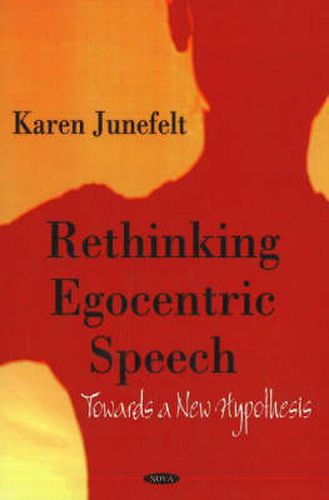Readings Newsletter
Become a Readings Member to make your shopping experience even easier.
Sign in or sign up for free!
You’re not far away from qualifying for FREE standard shipping within Australia
You’ve qualified for FREE standard shipping within Australia
The cart is loading…






Egocentric speech has been an important notion in the development of language and thought since Piaget (1923) published his book Le langage et la pensee chez l'enfant (Eng. The Language and Thought of the Child), and Vygotsky (1934) published his book Myshlenie i rech (Eng. Thought and Language). Their hypotheses about the development of thought and language have provided the theoretical basis for scholarly work during the last 80 years. However, their hypotheses about egocentric speech have seldom been questioned. In this book, the author will question their hypotheses using the same material that in her own research has led her to reorganise her thinking about egocentric speech: data from a blind child. The source material that informs the book is a longitudinal case study of a blind child that extended over eight years of time. In order to closely investigate egocentric speech in this book, data from only two video recordings will be analysed from three perspectives: Piaget, Vygotsky, and Bakhtin-Voloshinov. Coming from these analyses, finally, the author presents a new hypothesis on egocentric speech and its developmental significance for inner speech or thought.
$9.00 standard shipping within Australia
FREE standard shipping within Australia for orders over $100.00
Express & International shipping calculated at checkout
Egocentric speech has been an important notion in the development of language and thought since Piaget (1923) published his book Le langage et la pensee chez l'enfant (Eng. The Language and Thought of the Child), and Vygotsky (1934) published his book Myshlenie i rech (Eng. Thought and Language). Their hypotheses about the development of thought and language have provided the theoretical basis for scholarly work during the last 80 years. However, their hypotheses about egocentric speech have seldom been questioned. In this book, the author will question their hypotheses using the same material that in her own research has led her to reorganise her thinking about egocentric speech: data from a blind child. The source material that informs the book is a longitudinal case study of a blind child that extended over eight years of time. In order to closely investigate egocentric speech in this book, data from only two video recordings will be analysed from three perspectives: Piaget, Vygotsky, and Bakhtin-Voloshinov. Coming from these analyses, finally, the author presents a new hypothesis on egocentric speech and its developmental significance for inner speech or thought.